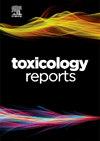Protective role of baicalin against methylparaben-induced reproductive toxicity: Insights into hormonal and enzymatic regulation
Q1 Environmental Science
引用次数: 0
Abstract
Background
Methylparaben is a commonly used preservative in the cosmetics, pharmaceutical, and food industries, valued for its antibacterial and antifungal effects. Numerous in vitro and in vivo studies have investigated its adverse effects on sperm count, testosterone levels, and reproductive organ weight. Baicalin, which comes from the dried roots of the plant Scutellaria baicalensis Georgi, is a natural compound that may have various health benefits, such as reducing fibrosis, itching, bacteria, oxidative stress, inflammation, and cancer. This study investigated the effect of baicalin on the changes in male reproductive hormones and enzyme activity brought about by methylparaben.
Method
A total of forty-five adult male Wistar rats were randomly allocated into nine distinct groups, each comprising five rats. Over a period of 28 days, these subjects were administered treatments via gastric gavage, which included distilled water, peanut oil, methylparaben, or differing doses of baicalin, either in isolation or in conjunction with methylparaben. Post-treatment, blood samples were obtained under terminal anesthesia for the purpose of serum analysis. Assays for hormonal levels (FSH, LH, testosterone) and enzymatic activity (17β-HSD3) were performed utilising ELISA and spectrophotometric techniques in accordance with established protocols.
Results
Rats treated with methylparaben (Group 3) had much lower levels of FSH, LH, testosterone, and 17β-HSD compared to the other groups, and baicalin was able to reduce these effects in a dose-dependent manner. Higher baicalin doses restored hormone and enzyme levels to near-control values levels indicating its protective benefits.
Conclusion
The results indicate that baicalin could mitigate the reproductive toxicity induced by methylparaben, owing to its antioxidant and regulatory characteristics, highlighting its potential as a protective agent against endocrine-disrupting chemicals
黄芩苷对羟苯甲酸甲酯诱导的生殖毒性的保护作用:激素和酶调节的见解
对羟基苯甲酸甲酯是化妆品、制药和食品工业中常用的防腐剂,因其抗菌和抗真菌作用而受到重视。许多体外和体内研究已经调查了它对精子数量、睾酮水平和生殖器官重量的不利影响。黄芩苷来自黄芩的干根,是一种天然化合物,可能有各种健康益处,如减少纤维化、瘙痒、细菌、氧化应激、炎症和癌症。本研究探讨了黄芩苷对对羟基苯甲酸甲酯引起的雄性生殖激素和酶活性变化的影响。方法选取45只成年雄性Wistar大鼠,随机分为9组,每组5只。在28天的时间里,这些受试者通过灌胃进行治疗,包括蒸馏水、花生油、对羟基苯甲酸甲酯或不同剂量的黄芩苷,单独或与对羟基苯甲酸甲酯联合使用。治疗后,在终末麻醉下采血进行血清分析。采用ELISA和分光光度法检测激素水平(FSH、LH、睾酮)和酶活性(17β-HSD3)。结果对羟基苯甲酸甲酯组(3组)大鼠FSH、LH、睾酮和17β-HSD水平明显低于其他组,黄芩苷能以剂量依赖的方式降低这些影响。较高的黄芩苷剂量可使激素和酶水平恢复到接近控制值的水平,这表明黄芩苷具有保护作用。结论黄芩苷具有抗氧化和调节作用,可减轻对羟基苯甲酸甲酯引起的生殖毒性,显示其作为内分泌干扰物的保护剂的潜力
本文章由计算机程序翻译,如有差异,请以英文原文为准。
求助全文
约1分钟内获得全文
求助全文
来源期刊

Toxicology Reports
Environmental Science-Health, Toxicology and Mutagenesis
CiteScore
7.60
自引率
0.00%
发文量
228
审稿时长
11 weeks
 求助内容:
求助内容: 应助结果提醒方式:
应助结果提醒方式:


